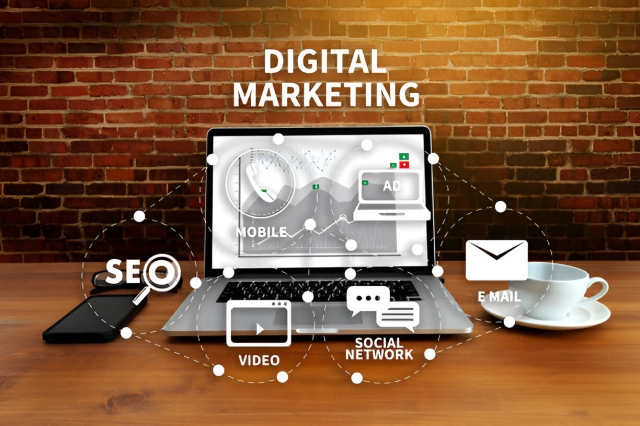In today's fast-paced digital world, social media platforms have become indispensable tools for businesses looking to increase brand awareness, connect with audiences, and drive conversions. However, with the multitude of social media platforms available, it can be challenging to determine which ones are best suited for your digital marketing efforts.
This blog will walk you through the most popular social media platforms, their unique strengths, and how you can effectively use them to enhance your digital marketing strategy. Whether you are a startup or an established brand, understanding these platforms will help you make informed decisions for your campaigns.
1. Facebook: The All-Rounder
With over 2.8 billion monthly active users, Facebook remains a dominant force in social media marketing. The platform is versatile, offering businesses access to a broad audience across various demographics.
Key Strengths:
- Wide Reach: Facebook's diverse user base allows businesses to target a wide range of customers, making it ideal for brands that cater to both younger and older audiences.
- Advertising Power: Facebook Ads provide comprehensive targeting options, allowing you to focus on age, interests, location, and even behaviors. Its retargeting capabilities are also excellent for following up with potential customers.
- Engagement Features: With Facebook Groups, Pages, and Events, brands can engage with their audience in a community-like setting, fostering a stronger connection.
Best For:
- B2C companies looking for mass appeal.
- Brands wanting detailed customer targeting and engagement.
2. Instagram: Visual Appeal and Engagement
Instagram, with over 1 billion users, has become a go-to platform for businesses focusing on visual content. With its visually driven interface, Instagram is perfect for brands in industries like fashion, lifestyle, and food.
Key Strengths:
- Visual Storytelling: High-quality images, videos, and stories help businesses create an engaging brand narrative.
- Influencer Marketing: Instagram is the home of influencers, making it easy for brands to collaborate with key opinion leaders and extend their reach.
- Shoppable Posts: Businesses can tag products in posts, making it easier for users to buy directly from the app.
Best For:
- Brands that rely heavily on visual branding, such as fashion, beauty, and travel.
- E-commerce businesses using Instagram Shopping to increase conversions.
3. LinkedIn: B2B Networking and Thought Leadership
LinkedIn is the platform of choice for professionals, offering an excellent opportunity for B2B marketers to reach decision-makers. With over 875 million users, it's the top platform for establishing authority and building business relationships.
Key Strengths:
- Professional Networking: LinkedIn helps businesses connect with industry leaders, potential clients, and talented employees.
- Content Marketing: Brands can share long-form content, articles, and updates to showcase thought leadership and industry expertise.
- Targeted Advertising: LinkedIn Ads allow businesses to target users based on job titles, industries, and professional interests, which can be incredibly effective for B2B marketing.
Best For:
- B2B companies looking to generate leads.
- Brands aiming to establish thought leadership within their industry.
4. Twitter: Real-Time Engagement and Conversations
Twitter's fast-paced environment makes it ideal for businesses that want to engage in real-time conversations with their audience. With around 368 million monthly active users, Twitter is a key platform for brands to share quick updates, engage in trending conversations, and provide customer service.
Key Strengths:
- Real-Time Interaction: Twitter's format encourages businesses to respond quickly to customer inquiries, trending topics, and industry news.
- Hashtag Campaigns: Brands can create and participate in hashtag campaigns to increase visibility and engagement.
- Customer Service: Many companies use Twitter to handle customer complaints and questions quickly, which can improve customer satisfaction.
Best For:
- Brands looking for real-time engagement with customers.
- Businesses running PR campaigns or event-based marketing.
5. TikTok: Short-Form Video and Viral Potential
TikTok has skyrocketed in popularity, especially among younger audiences. With over 1 billion monthly active users, it's become a powerful platform for brands to create engaging short-form videos that have the potential to go viral.
Key Strengths:
- Short-Form Video: TikTok's video format allows businesses to deliver engaging content in under 60 seconds, making it perfect for product demonstrations, challenges, and behind-the-scenes content.
- Viral Potential: The platform's algorithm often promotes trending content, providing even small businesses with the opportunity to go viral.
- Influencer Marketing: Like Instagram, TikTok has a thriving influencer community that brands can tap into for increased exposure.
Best For:
- Brands targeting Gen Z and younger audiences.
- Businesses that can create fun, engaging, and authentic content.
6. YouTube: Long-Form Content and SEO
YouTube is the second-largest search engine after Google, making it a powerful platform for brands that want to focus on long-form video content. Whether it's tutorials, product reviews, or vlogs, YouTube offers significant SEO benefits and high engagement rates.
Key Strengths:
- Video Content: YouTube is ideal for businesses that want to create in-depth content, including how-to videos, interviews, and reviews.
- SEO Benefits: YouTube videos often rank highly in Google search results, offering brands increased visibility.
- Monetization: Aside from promoting products, businesses can monetize their channels through ads, increasing revenue streams.
Best For:
- Brands looking to provide educational or tutorial content.
- Businesses that want to leverage video SEO to drive traffic.
Conclusion
The choice of the best social media platform for your digital marketing efforts depends largely on your brand's goals, audience, and the type of content you want to share. Facebook and Instagram are great for visual storytelling, LinkedIn excels for B2B marketing, while TikTok and Twitter are ideal for real-time engagement and viral content. YouTube remains unbeatable for long-form video content.
If you are a business looking to enhance your digital marketing efforts, partnering with a digital marketing company in Vadodara can provide expert guidance on which platforms are best suited for your specific needs and how to maximize their potential.






